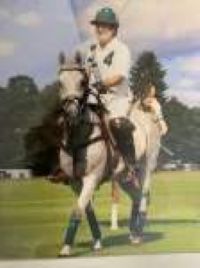
LAKE WORTH, FL (November 17, 2025) – The Board of Directors of the Museum of Polo have announced the 2026 inductees into the Museum’s Polo Hall of Fame.
The honorees are White Birch patron Peter Brant, arena star Billy Stevens, entrepreneur, philanthropist, club owner, and high-goal patron Melissa Ganzi, early pioneer Elisabeth “Pansy” Ireland Poe, equine advocate Clint Nangle, and legendary horses Citroen and Longpocket. Joe Casey Sr. will also receive his 2025 Iglehart Award. He was unable to attend last year because of illness.
And for the first time, the annual scholastic and collegiate awards presented by the Polo Training Foundation (PTF) will also be held during the Hall of Fame ceremony. The PTF is dedicated to teaching youth confidence, discipline, and leadership through the sport of polo.
The 37th Hall of Fame Induction Ceremony and Awards Dinner is one of the premier social events of the winter polo season in Florida. It is scheduled for Friday, February 13, 2026, at 6:30 p.m. at the Museum of Polo in Lake Worth, Florida.
Welcome to the Hall of Fame, Peter Brant.
Brant developed the powerhouse White Birch team and organization which dominated high-goal polo in the United States for about 25 years beginning in 1979. This spurred other teams to build and maintain a professional organization.
Brant’s teams won 31 tournaments rated at 26-goals or more, including a record 12 USPA Gold Cup titles and 5 World Cup crowns. White Birch also won the International Open 7 times, the C.V. Whitney 5 times, and the Monty Waterbury 5. Their dominance included winning the U.S. Open in 2005.
Individually, Brant achieved a 7-goal handicap, becoming one of the highest-rated amateur players in modern history, and is second with 11 career USPA Gold Cup tournament titles.
Off the field, he co-founded Greenwich Polo Club and revived the sport at both the Saratoga and Bridgehampton clubs.
Joining Brant in the Hall of Fame is Midwesterner Billy Stevens, who held an 8-goal arena handicap for 13 years and played competitively for 60 years until retiring in 2004.
His numerous titles ranged from 6-goal to 20-goal and included the U.S. Open Arena championship in 1980 and 1981, the 14-goal Continental Cup in 1975 and 1976, the 20-goal North American Cup in 1976, and the National 12-goal Arena in 1959.
Posthumous Hall of Fame inductee is Elisabeth “Pansy” Ireland Poe, a trailblazing pioneer who unofficially became the first woman player to obtain a handicap rating with the USPA in 1925.
Early in her career, the 5-foot-tall Poe played both on the grass and in the arena regularly and proved to be a formidable opponent to her male counterparts.
She dared to register with the USPA under the initials P.E. Ireland and received a handicap. However, after it was discovered that she was a woman, she was booted out of the association. That didn’t deter Pansy as she continued to play polo and helped pioneer the United States Women’s Polo Association.
She was also an accomplished hunter/jumper rider, fox hunter, and expert thoroughbred racehorse breeder.
Poe inherited her family’s home, Pebble Hill Plantation in Thomasville, Georgia and it became a museum after her death in 1978. On the second floor is the Elisabeth Ireland Poe Gallery where her collection of American and British Sporting Art is exhibited.
The Iglehart Award recipient for contributions to the sport is Melissa Ganzi, an innovative pioneer whose generosity and enthusiasm for philanthropy is legendary. She is the owner of Grand Champions Polo Club and Santa Rita Polo Farm, both in Wellington, and Aspen Valley Polo Club and she co-founded the 26-goal World Polo League.
Melissa has passionately elevated the profile of women athletes, making it a priority to give them numerous opportunities to play and learn through the Polo School Women’s Weekly Polo League.
She established the SunnyShip scholarship to honor the legacy of Hall of Famer Sunny Hale, generally acknowledged as the greatest women’s polo player of all time. Ganzi has also been instrumental in raising money for the Work to Ride program and annually hosts several charity events at Grand Champions and Aspen Valley.
She has generously given of her time and expertise as the longtime Chairman of the PTF (Polo Training Foundation) and is currently the President of the Museum of Polo.
As a player, Melissa achieved many historical firsts since getting a polo pony from her father-in-law for her birthday in 2000. A year later, she became the first woman to win the prestigious Monty Waterbury Cup.
Another significant first include Melissa and her daughter, Riley, as the first mother and daughter to play in the same U.S. Open in 2022. Ganzi is also very involved in bringing teams to snow polo tournaments around the world.
2025 Iglehart Award inductee Joe Casey set the pace as one of the first large-scale professional managers of the sport. While working in Tulsa for John T. Oxley in the 1960s, he managed horses for a high-goal team as well as the breeding operation and played on Oxley’s teams. He also was one of the first to go to Argentina to find additional horses for American high-goal polo. Many young players benefited from his knowledge and instruction.
On the field, Casey won the British Gold Cup with Oxley’s Boca Raton 1970. Other top highlights include winning the 1966 12-goal with Tulsa and capturing the Bronze Trophy and Inter-Circuit in 1981, also with Tulsa.
Clint Nangle is being honored as the posthumous Iglehart Award recipient and he will be remembered as a caring, kind, dignified champion of the sport. Clint, a natural-born lefty who started in polo at Myopia in 1962, was always positive and passionate about doing what was good for the betterment of polo, complemented by prioritizing good sportsmanship.
Nangle spent more than 20 years as a USPA Governor, 10 of those as the first elected Circuit Governor of the Florida/Caribbean Circuit which led to explosive growth and leadership of the circuit. He also spent 10 years as a Governor at Large and was the Club Polo Committee Chairman and a member of 9 other USPA committees and 3 special committees.
Nangle was also the Founder and Chairman of the USPA Equine Welfare Committee, which spotlighted awareness on the horses and implemented important policies on behalf of polo’s four-legged athletes for over 20 years. Other accolades include winning the Hugo Dalmar trophy for Sportsmanship in 2013 and National Equine Welfare Award in 2014. Nangle was also dedicated to the Museum of Polo and served on the Board from 1997 until 2015.
The Horses to Remember honoree of the early pre-Hartman era is Citroen, the Argentine-bred chestnut gelding purchased by Robert Lehman. Citroen won numerous major awards, including the 1928 Susan Townley Cup in Argentina. Citroen was also judged best polo pony in the 1930 and 1931 National Polo Pony Society Show, a rare feat for a gelding. Citroen was played by Hall of Famer Eric Pedley en route to victory in the 1930 Westchester Cup.
Billy Mulcahy’s raw-boned and wiry Australian thoroughbred Longpocket will be recognized as Horses to Remember, post-Hartman Award era. Numerous high-goalers, including Memo Gracida, Esteban Panelo, Piki Alberdi, Juni Crotto, and Mike Azzaro, played Longpocket.
In the 80-goal match in California in 1990, Longpocket played three out of seven chukkers. Longpocket was sturdy and rock-steady, with a big chest carrying a huge heart.
The black-tie Hall of Fame Awards Dinner is the most important annual fundraising event for the Museum, an independently run, not-for-profit 501(c)(3). Tickets are $350 per person and $3,500 for a table of 10. Contact the Museum of Polo by phone at (561) 969-3210 or (561) 969-7015, or e-mail: info@polomuseum.org for further details, information, or to make your reservations.


